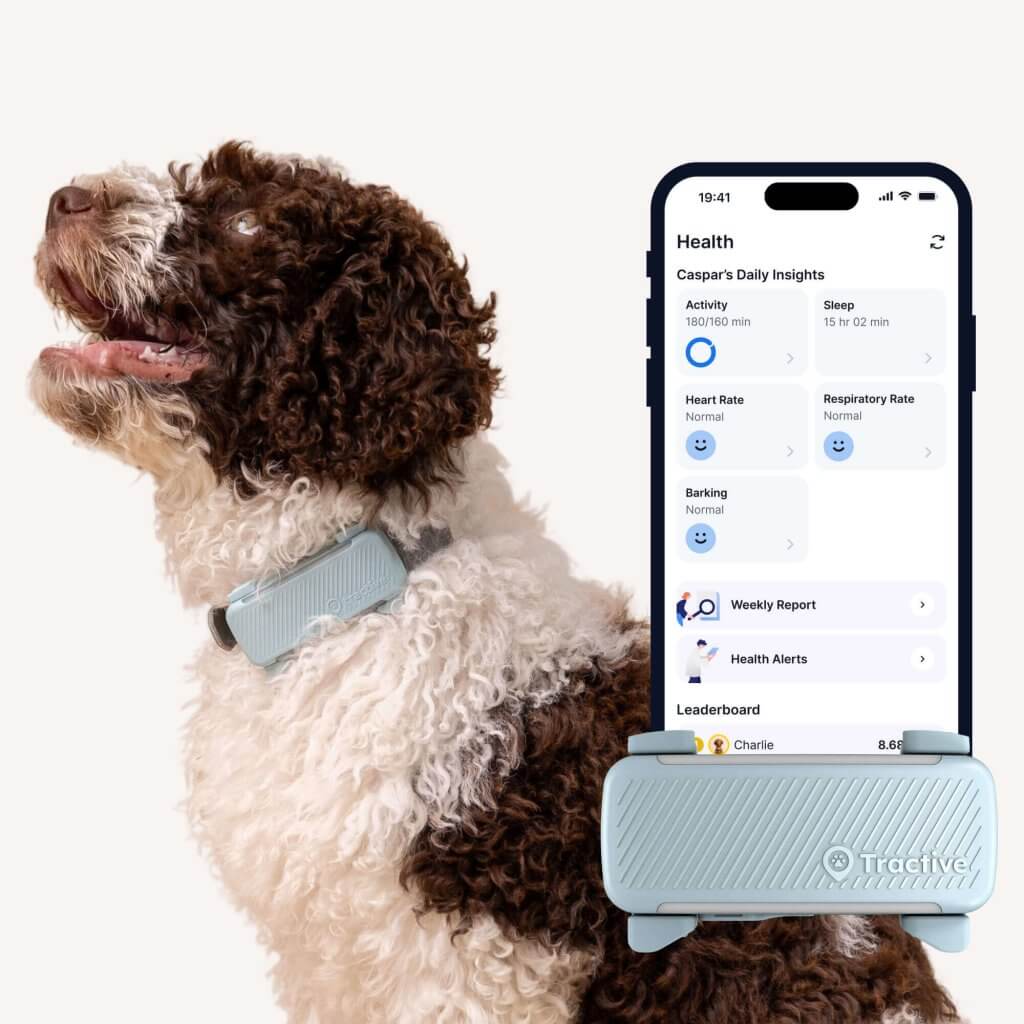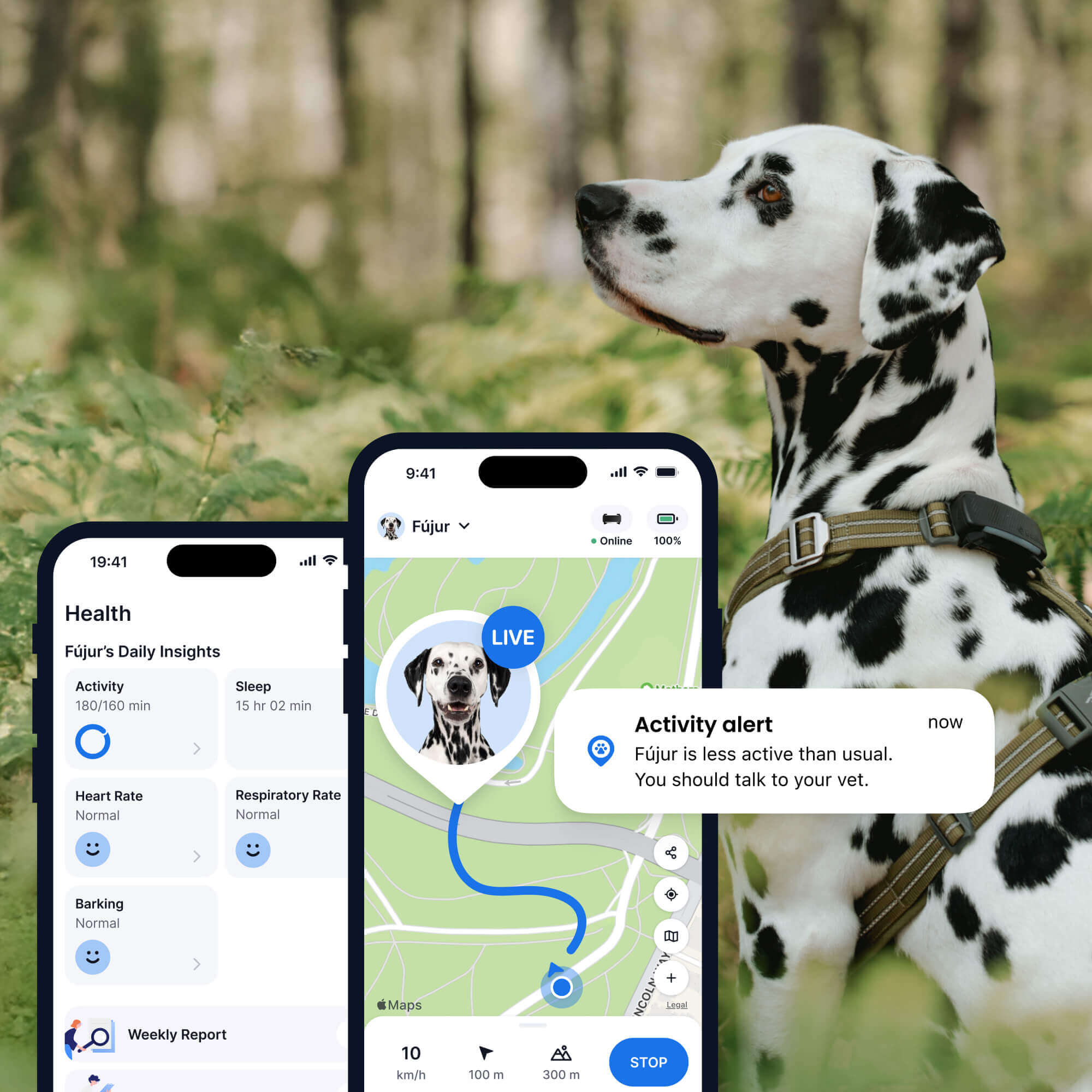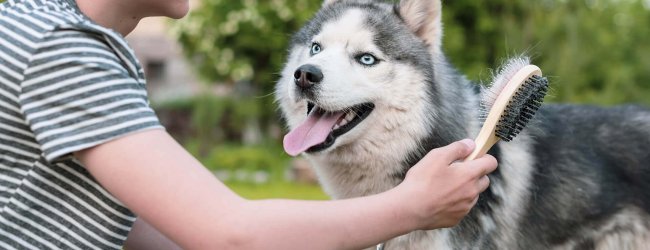Dog Hiccups: Why They Happen & What To Do
Dog hiccups aren't (usually) cause for concern - but they could also be due to an underlying health issue. Here's how to deal with them.

Have you ever been cuddling your pup and suddenly noticed a strange little spasm in their belly? Or heard that unmistakable hic sound coming from their mouth? Here’s a deep dive into dog hiccups – what causes them, how to treat them, and where a smart tracker for dogs can help you keep tabs on more than just hiccups.
Key Takeaways
🐶 Dog hiccups are usually harmless and often caused by excitement, fast eating, or overexertion.
❤️🩹 In some cases, frequent or prolonged hiccups can signal an underlying health issue. Including kennel cough, acid reflux, or even heat stroke.
🍎 Gentle remedies like offering water, slowing down meals, or going for a light walk can help ease hiccups.
🌎 A smart dog tracker like Tractive can monitor your dog’s vital signs – including their breathing rate – and help you catch on to any changes that may require a vet’s attention.

Always know your buddy is healthy & safe
Read moreWhat are dog hiccups, anyway? Are some dogs more prone to them?
Just like in humans, dog hiccups are involuntary contractions of the diaphragm – the muscle that helps your dog breathe. When the diaphragm spasms, it causes a quick closure of the vocal cords, resulting in that little “hic” sound. Most of the time, it’s totally harmless and passes on its own.
While hiccups can affect any dog, puppies are by far the most frequent hiccupers. Their developing bodies, immature nervous systems, and energetic behaviors make hiccups a common part of puppyhood. Puppy hiccups tend to be cute, short-lived, and (usually) nothing to worry about.
Brachycephalic breeds like Pugs, Bulldogs, and Shih Tzus tend to be more susceptible to breathing irregularities. This may include hiccups. Their shorter snouts can sometimes contribute to diaphragm spasms or inhaling air more quickly.
Finally, small breeds or toy breeds may be more sensitive to eating fast or getting overexcited. Both of which are common hiccup triggers.
Why does my dog have hiccups? The less concerning reasons
In most cases, dog hiccups are completely harmless and often go away within a few minutes. They may be due to:
- Eating or drinking too quickly
This is especially true for puppies. Gulping down food or water introduces air into the stomach, which can irritate the diaphragm. - Excitement or stress
From playtime or a car ride can cause your pup’s breathing to speed up, triggering hiccups. - Temperature changes
Drinking very cold water or being exposed to chilly air can sometimes bring on hiccups. - Overexertion
After a zoomie session or roughhousing with another pet or human, your dog’s breathing pattern might be off. Making hiccups pop up as a result. - Digestive issues
Occasionally, hiccups are tied to tummy troubles – like mild gas or indigestion. - Inhaling an irritant
Breathing in dust, smoke, or strong scents can irritate your dog’s airways. These can cause temporary hiccups as their body reacts. - Hyperventilation
Dogs that are panting heavily or breathing rapidly due to over-excitement or stress may begin to hiccup as a result of diaphragm spasms.
Medical conditions that might cause dog hiccups
- Respiratory infections
Irritation in the airways caused by infections like kennel cough can result in hiccups. If your dog is also coughing, sneezing, or seems breathless, a vet visit is in order. Chronic conditions (like asthma or bronchitis) that affect your dog’s ability to breathe normally can also cause hiccups. - Acid reflux or gastrointestinal upset
Conditions like GERD (gastroesophageal reflux disease) may trigger hiccups, especially if your dog also shows signs like burping, lip-licking, or discomfort after eating. - Nerve irritation or neurological issues
In rare cases, persistent hiccups can be caused by irritation of the phrenic or vagus nerve – or even by issues in the central nervous system, such as tumors or injury. - Parasites or toxic exposure
Some internal parasites or exposure to toxins can disturb normal body functions, potentially leading to hiccups among other more serious symptoms. - Heat stroke
Overheating can cause a range of symptoms, including rapid breathing and muscle spasms that may result in hiccups. This is a medical emergency, especially if accompanied by drooling, red gums, or collapse. - Nausea
Feeling nauseated due to illness, eating something toxic, or motion sickness can also trigger hiccups. Watch for signs like lip-smacking, restlessness, or vomiting. - Anxiety
Stress and anxiety can cause irregular breathing and tension, which may trigger hiccups in some dogs – especially in stressful environments or during loud events like fireworks.
💡A smart tracker for dogs which includes GPS and Health monitoring can help you spot a change in your dog’s breathing rate – which, more often than not, can signal sickness, lethargy, or pain. So you can catch on earlier to a potential illness and get your dog to a vet for an early checkup.

Get health alerts for your dog
Our pups can’t always tell us if something’s wrong. But if their tracker detects unusual changes in their routine, you’ll get an alert, helping you catch potential issues early.
When to head to the vet
While most cases of dog hiccups are nothing to worry about, here’s when to be extra cautious:
- Hiccups that last more than a few hours
If your dog can’t seem to shake the hiccups for an extended period, it might be more than a temporary spasm. - Hiccups paired with other symptoms
Look out for signs like vomiting, drooling, coughing, wheezing, fatigue, or general lethargy. These signs could indicate an underlying respiratory or gastrointestinal issue. - Changes in eating or drinking habits
If your dog is also refusing food or water, or seems uncomfortable after eating, it may be time to dig deeper with a vet. - Disrupted sleep or behavior changes
If hiccups are waking your dog up or they seem distressed or different from their usual self, don’t ignore it.
When in doubt, always trust your instincts. If something seems off or your dog’s hiccups feel unusual, your vet is the best person to help figure out what’s going on.
How to get rid of dog hiccups
Usually, hiccups go away on their own within a few minutes. But if your dog’s hiccups seem uncomfortable or persistent, here are a few gentle ways to help.
- Slow down their eating
Use a slow feeder bowl or spread out meals in a puzzle feeder. This can help reduce gulping and excess air intake. When your dog eats too fast, they tend to swallow air along with food. This can irritate the diaphragm and trigger hiccups. Slowing down meals helps minimize that risk. - Offer a small sip of water
A little water can help regulate the diaphragm and reset your pup’s breathing rhythm. This is especially useful if hiccups are caused by excitement or dry food. Just don’t let your dog chug the whole bowl – too much too quickly can make things worse. - Gentle belly rubs
Calming your dog with belly rubs or light massage can relax the muscles and ease hiccups. It also lowers their heart rate and breathing, especially if the hiccups were brought on by excitement or anxiety. - Distract your dog
Sometimes a change of pace or a light walk can help reset your dog’s breathing pattern. Movement encourages rhythmic breathing and gives the diaphragm a chance to settle. Just keep it low key – nothing too intense. - Avoid trying to “scare” your dog to get rid of hiccups
Unlike humans, dogs won’t understand the joke – and it may just stress them out.
Where a Smart Dog Tracker can step in
If your pup tends to hiccup often – or if you’re just a vigilant dog parent who wants peace of mind – the Tractive GPS & Health Tracker can be a game changer. Strapped to your buddy’s collar, you can now:
- Monitor your dog’s vital signs
With your tracker’s built-in Health Monitoring features. Changes in your dog’s breathing habits – like from hiccups – or their baseline heart rate can all be early signs something’s up. - Track your dog’s location in real-time
So you can take action before you find them headfirst in a trash bin or rummaging through your neighbors’ lawns for some extra “snacks.” - Catch on to a potential health issue quicker
Your tracker also monitors your dog’s activity levels and sleep quality – and sends you a Health Alert if there’s a weird change. (Which could signal illness or pain.)
Early detection means early action. By noticing subtle changes early – like a drop in activity or sleep quality – you can react quickly and get your dog to a vet before things get serious. Plus, you’ll also be able to share accurate data on activity, rest, and health alerts – saving time and giving your vet a clearer picture of what’s going on.
Wrapping up: No more panic over a “Hic!”
If your dog has hiccups, it’s usually just one of those quirky, harmless things that comes with being a pet parent. In most cases, they’re usually a result of eating too fast, excitement, or over-exertion. In rare cases, they can be linked to medical conditions – including kennel cough or heat stroke.
By paying attention to when they happen – and tracking your dog’s overall health – you’ll be in the best position to catch any issues early and give them the happiest, healthiest life possible.
And if you’ve liked this post, share it with a friend or a loved one – and let’s help build a safer, kinder world for our furry friends together.




